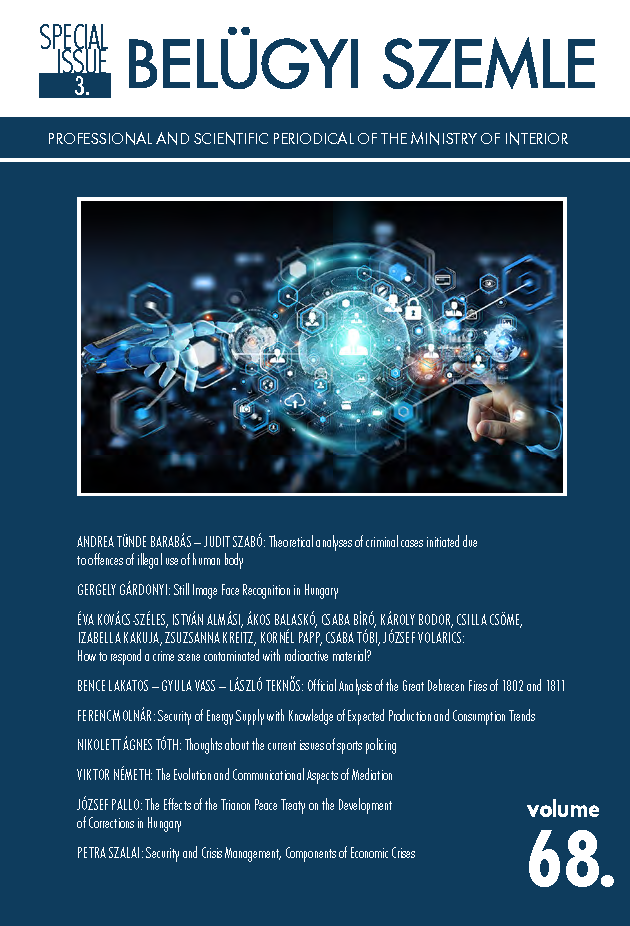Keywords
problem solving consensus building
participatory theory of communication (PTC)
system theory
How to Cite
Abstract
Since mediation, as a form of alternative dispute resolution, has become part of the canonized legal system, it has come to life and has made its own path of development from the 1950s to the present. In this paper, the process and the stages of it are discussed from communicational point of view through the terminology of the PTC. The sections also represent the types of mediation. Relationships and interactions between the types are also the subject of this study, as well as the scopes for certain types. The participatory theory of communication (PTC) allows us to review the development of mediation in the 20th and 21st centuries, from a facilitative mediation to a transformative mediation, according to a unified, transparent framework.
Downloads
Similar Articles
- Árpád Budavári, The change about that even Radio Yerevan could have reported, or the implementation of law enforcement reforms based on the theory of ‘broken windows’ in Kazakhstan and in Ukraine , Academic Journal of Internal Affairs: Vol. 69 No. 7 (2021)
- Balázs Kollár, Theoretical and practical questions concerning eyewitness identification in the United States , Academic Journal of Internal Affairs: Vol. 61 No. 10 (2013)
- Csaba Szabó, Proximity is endless , Academic Journal of Internal Affairs: Vol. 69 No. 3 (2021)
- Viktor Németh, Best practices in Hungarian organizational decision-making in the field of integrity management , Academic Journal of Internal Affairs: Vol. 69 No. 3 (2021)
- Szilveszter Póczik, Eszter Katalin Sárik, Péter Vass, Orsolya Bolyky, Particular criminalistic aspects of the COVID-19 pandemic , Academic Journal of Internal Affairs: Vol. 69 No. 3 (2021)
- Tamás Kovács, Place and role of social sciences in modern higher education of the law enforcement , Academic Journal of Internal Affairs: Vol. 70 No. 10 (2022)
- Tamás Tóth, New challenges of recruiting personnel for the national security services in light of the information society , Academic Journal of Internal Affairs: Vol. 68 No. 2. ksz. (2020): Special Issue
- Erzsébet Tőzsér, Organizational psychological studies in a county of the Hungarian Police – comparison of two departments , Academic Journal of Internal Affairs: Vol. 68 No. 1. ksz. (2020): Special Issue
- Szandra Windt, Community Planning for Safe Places , Academic Journal of Internal Affairs: Vol. 67 No. 9 (2019)
- Róbert Mahlaj, Leaders’ attitudes and communication in law enforcement , Academic Journal of Internal Affairs: Vol. 67 No. 4 (2019)
You may also start an advanced similarity search for this article.
Most read articles by the same author(s)
- Viktor Németh, Csaba Szabó, The characteristics of mediation according to fields of application , Academic Journal of Internal Affairs: Vol. 69 No. 4. ksz. (2021): Különszám
- Viktor Németh, The History of Regulating Mediation , Academic Journal of Internal Affairs: Vol. 70 No. 12 (2022)
- Viktor Németh, Neuroplasticity , Academic Journal of Internal Affairs: Vol. 69 No. 6. ksz. (2021): Különszám
- Viktor Németh, Critical Thinking , Academic Journal of Internal Affairs: Vol. 70 No. 2. ksz. (2022): Special Issue
- Viktor Németh, The international scientific visibility’s means , Academic Journal of Internal Affairs: Vol. 71 No. 4 (2023)
- Viktor Németh, The History of Regulating Mediation , Academic Journal of Internal Affairs: Vol. 71 No. 1.ksz. (2023): Special Issue
- Szandra Fazekas-Pátyodi, Viktor Németh, „Insisting on quality” , Academic Journal of Internal Affairs: Vol. 71 No. 5 (2023)
- Viktor Németh, How We Decide? ... and how should we decide? , Academic Journal of Internal Affairs: Vol. 70 No. 1 (2022)
- Viktor Németh, Best practices in Hungarian organizational decision-making in the field of integrity management , Academic Journal of Internal Affairs: Vol. 69 No. 3 (2021)
- Viktor Németh, COVID-19 The pandemic that never should have happened, and how to stop the next one , Academic Journal of Internal Affairs: Vol. 68 No. 2. ksz. (2020): Special Issue
